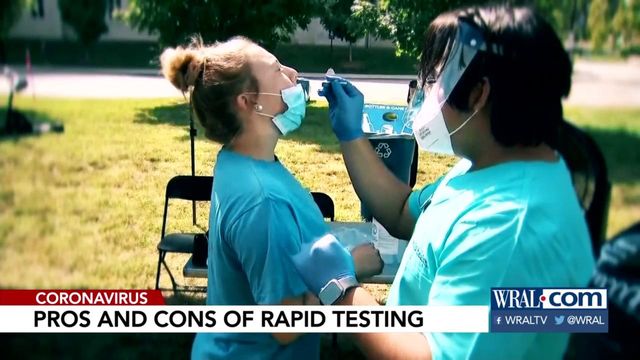Rapid Antigen Test: Pros and cons of rapid COVID testing
With demand for COVID testing rising across the country, more people are turning to Rapid Antigen tests for quick results -- but are they accurate?
Posted — UpdatedOne question: How accurate is it?
According to research, the test's accuracy depends on your symptoms.
There are currently two primary tests on the market:
- The traditional molecular
- The Antigen
The Antigen test uses the same technology as the rapid flu or strep test. The rapid test can be very accurate, but your symptoms, your exposure, and your doctor's guidance dictate which test is right for you.
"The test takes about 15 minutes," said Dr. John Carmack, Medical Director of American Family Care in Fuquay-Varina.
Carmack calls the Rapid Antigen test a powerful tool in detecting COVID-19.
"The advantage of the antigen test is being able to rapidly diagnose someone who is COVID positive and advise them on isolation precautions so that they're not in the grocery store behind you," said Carmack.
While most Molecular or PCR tests can take days, Rapid Antigen takes minutes.
The PCR is geared toward all patients, while the antigen is recommended for those with symptoms or those exposed to settings with known positive cases.
The CDC still calls the molecular test the "gold standard" because the antigen has seen more false negatives. Symptomatic people who test negative are advised to get a new test.
"If an individual is just curious about their status, that they might be infected with SARS COV 2 and they have no known exposure, no symptoms – a rapid antigen test is not ideal for that scenario," said Dr. Scott Shone, who directs the North Carolina Public Health Lab.
For people who are considering getting a COVID test, the first thing they should do is talk to their health care provider.
Speed and accuracy aside, tests are still only one part in curbing COVID.
"In order to really get this virus under control, we all need to be thinking a lot about prevention and wearing our masks, washing our hands, waiting our six feet," said Shone.
Keep in mind, this research relates to antigen tests, not antibody testing.
Antibodies can show if you've had COVID in the past.
Go to Find My Testing Place on the North Carolina DHHS website to see where and what kind of tests are near you.
Related Topics
• Credits
Copyright 2024 by Capitol Broadcasting Company. All rights reserved. This material may not be published, broadcast, rewritten or redistributed.





